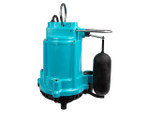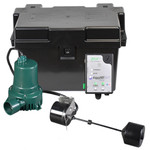During that winter time transition into warmer months, many homeowners may ask themselves a simple question, “what does a sump pump do?” And, while some may already know the answer, there are still thousands of homeowners who’ve never had to worry about flooding. Essentially, a sump pump helps protect your home from potential flooding and water damage by removing any rising water levels from your basement. It’s an incredibly vital piece of equipment to have and could potentially save you thousands of dollars in damage.
To make sure you know all there is to know about sump pumps, here’s a brief overview of what they are and how they work.
Benefits of a Sump Pump
A sump pump is a device that removes water from the lowest point in your home, such as a basement or a crawlspace, as well as the soil below, and pumps it out away from your home. The goal of a sump pump is to help homeowners avoid flooding, water damage, and mold accumulation, especially during wetter months, such as late winter/early spring, when snow melt and rainy days bring tons of fast moving water. Sump pumps are also great for those who live in particularly flood-prone areas.
Some general benefits a sump pump provides include:
- Preventing basement flooding
- Keeping home safe from mold and mildew by removing excess moisture
- Reducing humidity levels
- Protecting your home’s foundation from erosion
- Preventing termites or other harmful insects
- Increasing property value
How Does a Sump Pump Work?
Sump pumps are generally placed in the lowest point of a basement or crawl space in a sump pit. The majority of sump pumps have a float that rises with the water level and automatically triggers the motor to start pumping water out once it reaches a specified level. Often categorized as “preventative maintenance”, these devices can save homeowners a fortune from flood damage, and are valuable beyond their cost for many. For most homeowners, they don’t know their sump pump has gone bad until their homes suffer major floods.
How Long Do Sump Pumps Last?
The average lifespan of a sump pump is around 10 years before you may begin to notice some malfunctioning. However, a handful of factors come into play in terms of longevity, and many of these are noticeable features that can let you know ahead of time that your pump may not be working up to speed. These can be anything from:
- The pump won’t engage - This tends to happen when the pump is clogged with dirt, debris, and dust, most often a result of a loose-fitting lid. Further, the pump float can become obstructed or jammed when rust and gunk builds up around it. This means the pump has to be serviced or replaced. This can be caused by several factors. Here are a couple of the more common reasons:
- Switching system is jammed - This can sometimes be from wires getting tangled, or can naturally occur. The switch is the main point of failure on a pump and, like all things mechanical, will fail eventually.
- Rust around the base -When corrosion and rust is present near your pump’s motor and float, chemical build-up and bacteria can damage the system.
- Pump has been running for a long time - In particular wet areas, the constant on/off cycle of the pump can wear it out rather quickly. Moreover, the pump may not be strong enough to move the volume or water the distance required to get it out of your house. If your pump is running for a long time each time it turns on, there may be a blockage or the motor may be too weak to handle the job.
- Pump rarely turns on - The lifespan of a pump can be greatly reduced if it isn't engaging regularly. Consider a sump pump journal to track how your sump pump is operating, and perform frequent tests. You may be on naturally high ground and your sump pump simply may not need to turn on as often.
- Pump runs constantly - Non-stop running is a common cause for pump failure. Since the float acts as an on/off switch for the sump pump, any shifts or changes of position to the float can lose its calibration. Sump pumps can move a lot of water, so if it is constantly running it is going to “run dry” and burn itself out.
- Frequent power outages -Electrical systems can be subject to power surges that coincide with power outages. Power outages can fry the electrical components within a pump. Battery or water powered backup pumps can protect you even if you are in an area prone to power outages.
Backup sump pumps are also highly recommended for anyone, no matter the type of pump they have. While most primary pumps operate on electricity, these backups are powered by either battery or water pressure. Since power outages and malfunctions can certainly arise in circumstances where a sump pump will be needed, having a backup can act as further defense against flooding if your primary fails.
Sump Pump Costs
The average cost of a sump pump is around $250, but prices have been known to vary from $150 to $700, and can be even higher for special circumstances. Having a sump pump installed by a professional waterproofer may cost you an extra $100 to $200. Also, if you’ve never had a sump pump before, you might need to have a sump pit dug, which could increase your costs by $750 to $1,000. While the initial cost may seem daunting, the long time money a pump will save you makes it absolutely worth it.
Best Sump Pumps
If you’re looking for the best sump pump for your home, Plumbing-deals.com has you covered. Our growing list of sump pumps and sewage ejectors gives customers all the tools and attachments they need to have the best running pump possible. Among our best sellers is the Zoeller Sump Pump, strapped with a 12 Volt DC backup, or our Little Giant Sump Pump, providing affordability and efficiency for smaller homes. Our Shellback Pump is another fantastic mid-range choice for any and all homes.
Do you think a sump pump is right for you? Contact plumbing-deals.com today to learn more about our exceptional products, or for any general inquiries.




